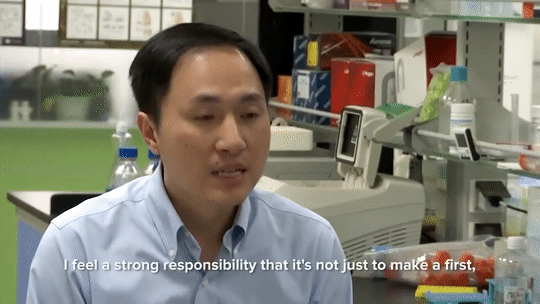
For those people who have HIV, worry not about your children. A Chinese scientist created the first genetically modified twins to battle HIV. The scientist, He Jiankui, has a laboratory at a university in Shenzhen, China. He Jiankui also runs two genetics companies. With approval from the Shenzhen Harmonicare Women’s and Children’s Hospital, the scientist proceeded with the project.
He Jiankui Battles HIV with Genetically Modified People
To edit the human genes, He Jiankui recruited couples from Beijing’s Baihualin, an AIDS advocacy group. Each couple in the test consisted of one male HIV partner and one female non-HIV partner. They were made aware of the process and consented to gene editing for embryos that they chose. He Jiankui’s project disabled the CCR5 gene, which forms a protein allowing HIV to enter a cell. Both copies of the gene need to be edited to completely prevent the disease. Even if the gene is disabled perfectly, the risks of getting other viruses such as West Nile virus and the flu increase.
Out of the embryos that He Jiankui edited for the seven couples, there has been one pregnancy so far. It is a twin pregnancy, of which one twin has both copies of the gene-altered, while the other twin has only one copy of the gene altered. This suggests that the gene editing process for one baby was for purposes of testing, rather than avoiding the HIV disease. Thus, the experiment has widely caused controversy.
Shenzhen, China Hospital: Mutants Are Ethical When It Comes to Battling HIV
The Shenzhen Harmonicare Women’s and Children’s Hospital in China believes that the project for genetically modified babies is ethical, especially when it comes to battling HIV. But, other organizations in China do not seem to agree. The University in Shenzhen, where He has a laboratory, condemned He’s work. He Jiankui went on leave from teaching early this year but is still part of the university’s faculty.

Internationally, scientists differ in opinions. Some professionals in the United States, including Dr. Eric Topol, criticize He’s work. They believe that HIV is easy to treat with medication and that gene editing can potentially cause other medical risks. However, while China outlaws human cloning, it does not specifically outlaw gene editing.
Opinions also differ because of China’s stigma against HIV and AIDS. According to Beijing’s Baihualin, the reality is that HIV-infected people in China have a real possibility of losing their jobs or getting adequate medical care if their infections come to light. Harvard University’s George Church, a famous geneticist, also defended the attempted gene editing to battle HIV, calling the goal “justifiable.”
While we are not sure what the future may hold for mutant babies and gene editing, we are certain that some groups may push for certain diseases to disappear. Thus, it might, in the long run, help eradicate some of the most crippling and untreatable diseases of the modern age. We will see, in time, if people start to expand gene editing to other areas such as eye color.


























